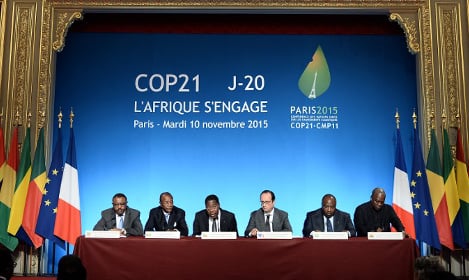Average global air temperatures in 2014 were 0.57 degrees Celsius higher than the long-term average of 14 degrees for a 1961-1990 reference period, the World Meteorological Organization (WMO) said.
"Fourteen of the 15 hottest years have all been this century," said WMO secretary general Michel Jarraud in a statement.
"In 2014, record-breaking heat combined with torrential rainfall and floods in many countries and drought in some others — consistent with the expectation of a changing climate," he added.
Global sea-surface temperatures also reached record levels.
'Global warming to continue'
United Nations members will meet in Geneva next week for talks on a global climate pact that must be signed in Paris in December for curbing greenhouse gas emissions.
The UN seeks to limit warming to no more than 2 C over pre-Industrial Revolution levels, but scientists warn the Earth is on target for double that target — a scenario that could be catastrophic.
"We expect global warming to continue, given that rising levels of greenhouse gases in the atmosphere and the increasing heat content of the oceans are committing us to a warmer future," said Jarraud.
The WMO said that only a few hundredths of a degree separated the warmest years.
Average global air temperatures in 2010 were 0.55 C above average, compared to 2014's 0.57 C, and 0.54 C in 2005.
Also notable was that the 2014 record occurred in the absence of a fully-developed El Nino system — a periodic weather phenomenon that has an overall warming impact on Earth's climate.
High temperatures in 1998 — the hottest year before the 21st century — occurred during a strong El Nino.
The WMO report is a consolidation of leading international datasets, including research by NASA, the US National Oceanic and Atmospheric Administration (NOAA), the Met Office's Hadley Centre and the University of East Anglia's Climatic Research Unit.
Some of the data goes back to 1850.
Scientists warn that a 4 C warmer Earth would be hit by more catastrophic droughts, floods, rising seas and storms, with wars likely fought over ever-scarcer resources like water.
Fraught UN negotiations for a climate-saving pact, scheduled to enter into force from 2020, are at a difficult phase and campaigners and observers fear a weak compromise as nations continue to disagree of some of the very fundamentals.
Countries have committed to make emissions-curbing pledges before the Paris gathering — starting next month for those nations in a position to do so.
Emissions must be slashed by 40-70 percent by 2050 from 2010 levels and to near zero or below by 2100 for a good chance of reaching two-degree warming, the UN's Intergovernmental Panel on Climate Change said in a report last year.


 Please whitelist us to continue reading.
Please whitelist us to continue reading.
Member comments